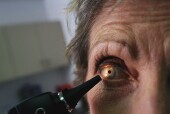- Are You Making This Expensive Thermostat Error This Winter?
- Recognizing the Signs of Hypothyroidism
- 10 Strategies to Overcome Insomnia
- Could Artificial Sweeteners Be Aging the Brain Faster?
- Techniques for Soothing Your Nervous System
- Does the Water in Your House Smell Funny? Here’s Why
- Can a Daily Dose of Apple Cider Vinegar Actually Aid Weight Loss?
- 6 Health Beverages That Can Actually Spike Your Blood Sugar
- Treatment Options for Social Anxiety Disorder
- Understanding the Connection Between Anxiety and Depression
Scientists Explore Better Way to Deliver Treatment for Eye Disease


Scientists may have found a new method for treating age-related macular degeneration, a leading cause of blindness.
People with the condition suffer a loss of central vision, and those with advanced stages of the disease can’t read, watch TV, drive or use computers.
There are two forms of age-related macular degeneration, dry and wet. Dry age-related macular degeneration accounts for the majority of cases, but wet age-related macular degeneration causes more than 90 percent of the associated cases of blindness. Blindness in people with the wet form of the disease is caused by abnormal growth of blood vessels behind the retina, scientists note.
In this study, researchers found that a protein called IL-18 protects eyesight by preventing the production of abnormal blood vessels behind the retina. They also found that IL-18 seems effective when given intravenously instead of through injections directly into the eye.
“We were initially concerned that IL-18 might cause damage to the sensitive cells of the retina, because it is typically linked to inflammation,” study first author Sarah Doyle, an assistant professor of immunology at Trinity College Dublin in Ireland, said in a college news release.
“But surprisingly we found that low doses had no adverse effects on the retina and yet still suppressed abnormal blood vessel growth,” Doyle said.
The study was published online April 2 in Science Translational Medicine. It was partially supported by pharmaceutical maker GlaxoSmithKline.
Currently, treatment options for wet age-related macular degeneration are limited to the advanced stages of the disease and involve regular injections directly into the eye, according to the news release.
More information
The U.S. National Eye Institute has more about age-related macular degeneration.
Source: HealthDay
Copyright © 2026 HealthDay. All rights reserved.










